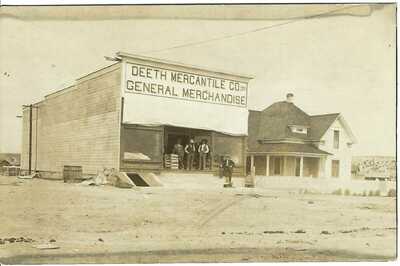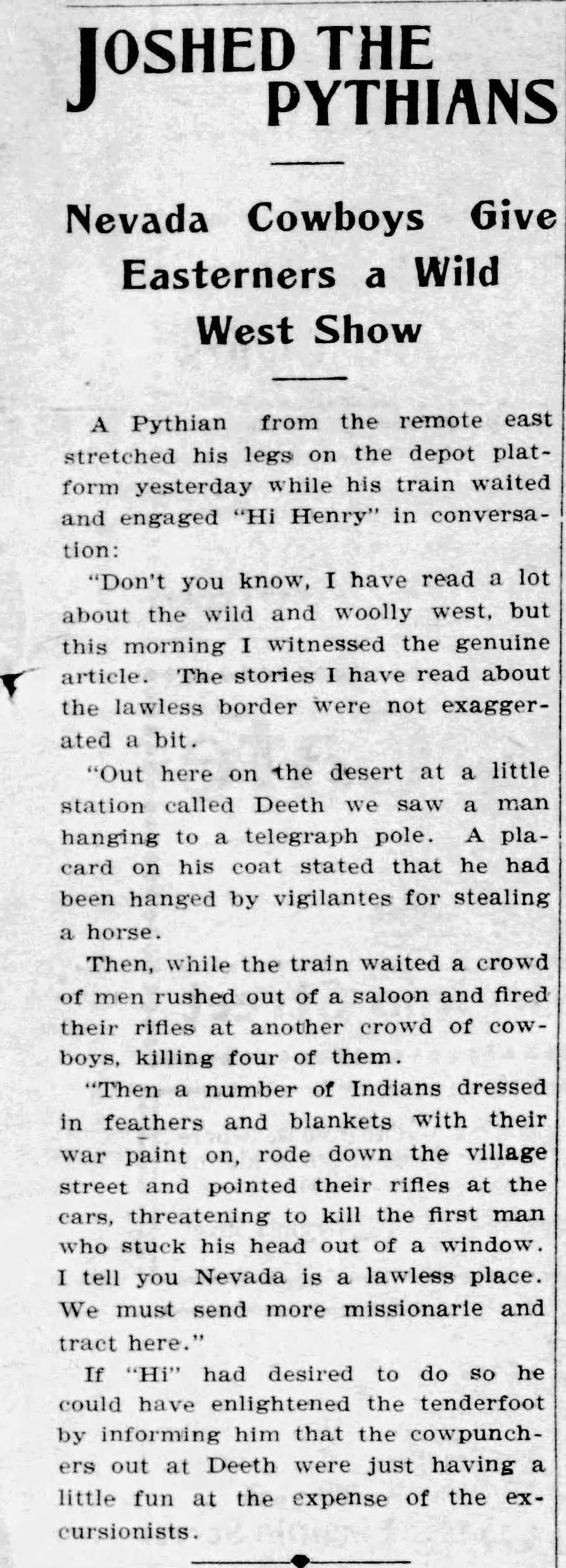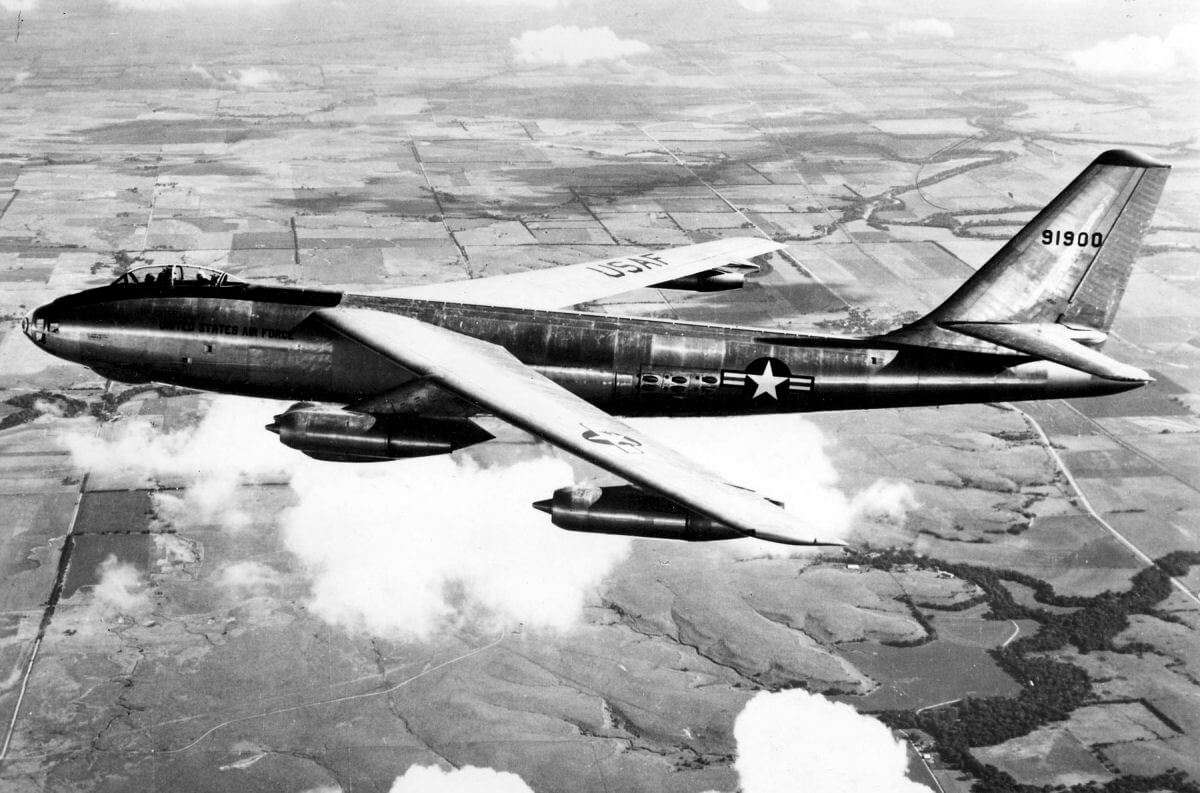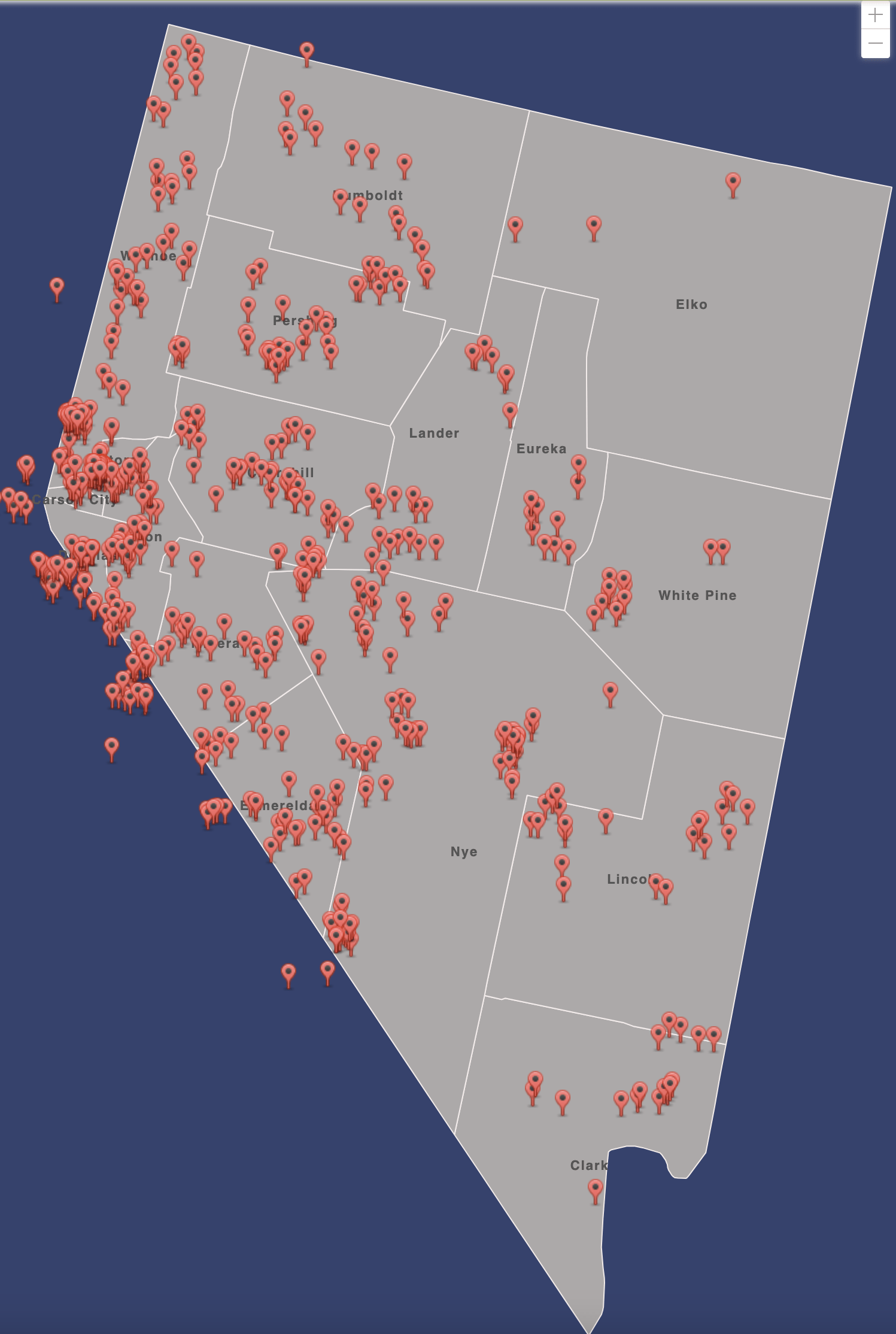The history of the semi-ghost town of Deeth spans Native Americans, emigrant wagon trains, the Transcontinental Railroad, and Nevada’s early settlement. Home of Nevada’s second Governor, “Old Broadhorns,” the town once was a hub of activity, including an orchestra and opera house. The town was even known for some theatrics, such as when a group of cowpunchers put on an impromptu Old West performance for a train of unsuspecting greenhorns.

Now a ranching community, during the Cold War, B-52s and B-47s flew over Deeth twenty hours a day, “radar bombing” the community. The men stationed at Deeth enjoyed the outdoors but found one surprising negative to rural living.
Death or Deeth?
The Shoshone were the first to use the area around Deeth as a seasonal camp. In the 1840s, the California Trail went through Deeth, and thousands of emigrants passed through on their way to the gold country.
This is a beautiful valley all the low parts next to the river being coveed with grass about knee high.
Elijah Howell August 7, 1849 (Trails West historical marker)

There are several theories to the naming of Deeth. One is that emigrants named the area Death, thinking they would meet their end in the water-starved desert. Over time, the name corrupted to Deeth. The second theory is that the town is named in honor of a man named Deeth, who had a trading post on the Humboldt River. It could be a combination of both. Emigrants nicknamed the site Death, but the spelling changed to reflect the area’s first settler.
Arrival of the railroad

(Photo credit: Desert Empire Project)
In 1869, the Central Pacific Railroad arrived in Deeth. The line built a sidetrack and telegraph service. The town grew slowly, and a post office opened in 1875. The first business in Deeth was a saloon owned by Tom Atkinson. Two years later, James Porter opened a 2-story store and botel. Porter’s brother started a livery. In 1879, Ed Seitz, an early settler and Elko County sheriff, purchased the saloon and added a hotel.

By 1880, thirty-one souls called Deeth home and the railroad added a section crew, warehouse and water tower. The small town became the shipping and supply center for nearby Starr and Ruby Valleys agricultural areas.

“Old Broadhorns”
The largest business in the area was Bradley Cattle Company. Bradley opened a competing store, advertising prices lower than his competition. Residents loved the competition as it kept their prices similar to Elko’s. Lewis Bradley served as Nevada’s second Governor from 1871 to 1879.

(Photo credit: Wikipedia)
Bradley’s nickname was “Old Broadborns.” In 1852, he drove a herd of longhorn cattle across the California trail through what would become Elko. Finding California too crowded, he headed east and settled in Deeth. He was known as an honest man who stood by his handshake and would take the proverbial bull by the horns. One piece of legislature Bradley changed was the appointment of the Nevada State Prison warden. The current warden, Lt. Governor Denver, refused to leave his post. Denver said the guards would fire upon anyone who attempted to enter the prison, and if necessary, he would release and arm the prisoners to defend the prison. Denver changed his mind… only after Old Broadhorns sent the militia with 60 soldiers and artillery. Learn about the Mutiny at the Nevada State Prison.

Extra, extra, read all about it!
Reverand Merchant Riddle started publishing Deeth Tidings in 1896. The weekly paper was eight pages, costing $2 for an annual subscription. With such a small population, Riddle relocated his paper to Elko within months, renaming it Nevada Silver Tidings. In 1912, A.B. Gary started the Commonwealth. The weekly paper came out each Wednesday and cost $1.50 annually. The paper was published for two years before Gary relocated to Carson City. John Seabury printed the Deeth Divide in 1915, but the paper folded almost immediately.

(Credit: Valuable Rare Postcards)
Porter sold his holdings, including the store, hotel and home in 1899 to A.C. Dorsey. In 1903, a Chinese cook smoked opium in his room and set the hotel on fire, causing a total loss.

In 1910, Jarbridge experienced promising strikes and the town boomed. Jarbridge was isolated from Nevada and obtained services from Twin Falls, Idaho. Local businesses, ranchers and the Southern Pacific raised $10,000 to construct a road from Deeth to Jarbridge. Ten horse teams left Deeth daily for Jarbridge, a ride costing $10. The Western Pacific Railroad arrived, building a large depot that same year.

Reno, Nevada · Thursday, May 08, 1913
At its peak, Deeth had a population of 250. Businesses offered every service imaginable, including stores, hotels, dance halls, pool halls, five saloons and a red-light district. The town’s highlight was the Bradley Opera House, where the Deeth Orchestra and traveling groups performed.

(old postcard)
Going down in flames

In 1913, fire again struck Deeth, this time destroying two saloons. A fire started in the Mayer Hotel in 1915, destroying over half of the town’s businesses. With the arrival of automobile travel, business in Deeth declined. Many stores and homes moved to the larger towns of Elko and Wells. A handful of people remain in Deeth and the post office continues to serve the local ranches.


Joshed the Pythians

Reno, Nevada · Wednesday, August 13, 1902
In 1902, sixty miles east of Palisade, a group of Nevada cowboys revived Palisade’s hoax performances for unsuspecting train passengers. They staged a lynching for horse thievery. A shoot-out occurred, ending in the “deaths” of four cow punches. Soon, Native Americans arrived in war paint and feathers, threatening to shoot the first man who poked his head out the train windows.

Later in his travels, one of the Pythians who was onboard relayed the story to “Hi Henry.”
I have read a lot about the wild and wooly west, but this morning I witnessed the genuine article. The stories I have read about the lawless border were not exaugurated a bit….I tell you, Nevada is a lawless place. We must send more missionaire (sic) and tract there.
Hi Henry decided to keep the theatrics to himself and let the dandy greenhorn believe the Wild West was still very much alive in Nevada.

Reno, Nevada · Wednesday, August 13, 1902
New life for Deeth

Reno, Nevada · Sunday, May 12, 1963
In 1963, the US Air Force found a new use for Deeth: a bomber “target.” On April 7, the 18-car Radar Bomb Scoring Express (RBS Express) arrived and parked at a Deeth siding. The local youth were warned to avoid the train. For days, the 75-man crew believed they were stationed at a ghost town.

(Photo credit: United Railroad Historical Society)
The trains were equipped with jammers to interfere with high-altitude bombers. During the radio bombing “games,” SAC B-47 and B-52’s flew in from around the Western United States. For months, the bombers could be targeting the tiny town of Deeth twenty hours a day.

(Photo credit: Flight Manuals)
The men stationed in Deeth enjoyed their time off fishing and hunting. Captain Rutscher declined offers for his men to ride the local broncs, saying, “SAC is especially hot on ground safety right now.” The men’s only regret in Deeth was that they had the most highly sophisticated radar and radio equipment, yet they couldn’t make their televisions work!

Photo credit: The National Interest)
WANT MORE GHOST TOWNS?
For information on more than five hundred ghost towns in Nevada & California, visit the Nevada Ghost Towns Map or a list of Nevada ghost towns.

References
- Carlson, Helen S. Nevada Place Names: A Geographical Dictionary. University of Nevada Press, 1974. Page 95.
- Gammet, Games and Stanley W. Paher. Nevada Post Offices: An Illustrated History. Nevada Publications, 1983. Page 56.
- Hall, Shawn. Connecting the West: Historic Railroad stops and stage stations in Elko County, Nevada. University of Nevada Press, 2002. Page 102-105.
- Hall, Shawn. Old Heart of Nevada: Ghost towns and mining camps of Elko County. University of Nevada Press, 1998. Pages 184-188.
- Lingernfelter, Richard E. and Karen Rix Gash. The Newspapers of Nevada: A History and Bibliography 1854-1979. University of Nevada Press, 1984. Page 60.
- Nevada Expeditions: Deeth
- Nevada Ghost Towns and Mining History: Deeth
- Nevada State Journal, August 13, 1902
- Nevada State Journal, May 12, 1963
- Paher, Stanley W. Nevada Ghost Towns and Mining Camps. Nevada Publications, 1970. Page 220.
- Reno Gazette-Journal, May 08, 1913
David Sadewasser says
Fantastic research again, Tami. Really helps put life into travel as one zips by these exits on I-80.
Many thanks!
Tami says
Welcome, there is so much history once you start digging.
Terry says
Thanks for doings this. I look forward to it.
Ron Dow says
Thanks again Tami. A lot of interesting information. Now that I am fully retired and having owned Jeeps for 50+ years i am looking for more of what Nevada offers.
Tami says
Congratulations on your retirement!
Gar Johnston says
Jarbidge…
I had no idea Deeth was so interesting. Thanks Tami
Tami says
I had no idea it was such a large town. I can’t imagine an opera house there now!